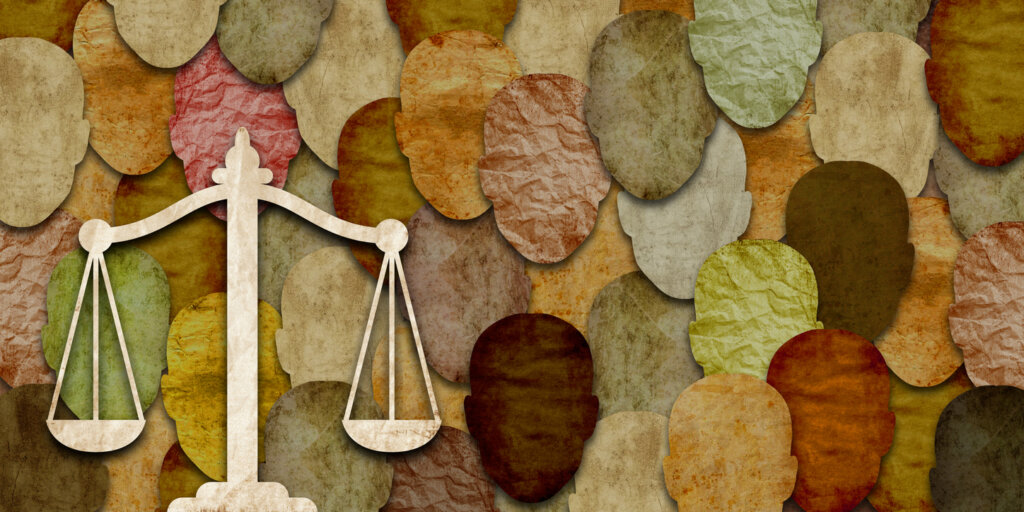John Rawls and The Veil of Ignorance


Written and verified by the philosopher Matias Rizzuto
It’s impossible to delve into the political philosophy of the 20th century without taking into account the work of John Rawls. For many, his theoretical proposal reactivated the reflection on justice in society, while others consider it to be excessively idealistic. However, it’s difficult to be indifferent to his work, especially in the face of one of his most fundamental ideas: the veil of ignorance.
This is a conceptual tool that helps to eliminate partiality and bias in political decisions. Although Rawls has had a profound influence on philosophy, his ideas also have weight in the field of economy, political science, and sociology. In fact, they’re often used as an argumentative basis for political decision-making.
Most of Rawls’ philosophical development can be found in his book, Theory of Justice, in which he attempted to design the principles that every just institution should follow, in terms of the distribution of duties and fundamental rights. This is confirmed in an article published in the journal, Revista de Relaciones Internacionales, Etrategia y Seguridad.
Rawls and contractualism
Rawls’ perspective is based on the contractarian tradition. It maintains that the norms and principles that govern life in society result from a fair and equitable agreement among all members of that society. Some of the most relevant thinkers in this tradition were Locke, Rousseau, and Immanuel Kant. But, Rawls takes the contractarian vision to a higher level of abstraction.
For him, society is a ‘cooperative enterprise’: a group of people who come together to pursue common goals. Although most accept and recognize certain mandatory rules of conduct, conflicts of interest are inevitable. For this reason, it’s essential to work on the design of principles of justice that guarantee equity.

The veil of ignorance
When individuals make decisions about the principles that should govern society, they tend to seek the benefit of their own interests. For example, say someone is choosing how resources will be distributed in a society. If they were a farmer, they’d look for greater investments in the agricultural sector. On the other hand, a scientist would choose the financing of certain research projects.
The veil of ignorance is a metaphor used to represent the idea that, when making decisions about the norms and principles that govern society, individuals should be veiled from information about their identity.
For Rawls, people in a just society should decide without the influence of certain of their own characteristics. They’re as follows:
- Ethnicity.
- Gender.
- Social position.
- Level of wealth.
- Sexual orientation.
“Justice is the first virtue of social institutions, as truth is of systems of thought.”
-John Rawls-
How does the veil of ignorance work?
According to Rawls, the principles of justice selected by rational, free, and equal individuals have universal validity. To guarantee the impartiality of these decisions, it’s essential to design a procedure that ensures objective results.
To do this, the philosopher proposes to situate themselves in what they call the ‘original position’. This is an ahistorical moment, a hypothetical situation in which individuals opt for different principles to direct the institutions.
This proposal replaces the traditional notion of a social contract. It’s the kind of agreement in which individuals can further their own ends on an equal footing. In the original position, the veil forces decisions to be made for the benefit of a specific social sector.
Therefore, it’s possible to achieve what Rawls calls reflexive equilibrium, where the decisions made by all those involved conclude in impartial norms. A text published in the Stanford Encyclopedia of Philosophy Archive states that this is the last phase of the deliberative process.
What principles would people choose, according to Rawls?
Once deprived of all their circumstantial qualities, social positions, and personal interests, individuals choose certain principles to govern the institutions. It’s not enough for such principles to be operative and efficient, they must also be fair.
According to Rawls, utilitarianism, a principle that maximizes the sum total of individual satisfaction, would be rejected, since it doesn’t consider the distinction between individuals. Instead, there are two foundations that favor everyone fairly, regardless of their social position. They’re as follows:
- Principle of freedom. It determines that everyone has equality in their basic freedoms.
- Difference principle. It establishes that inequalities in social goods and opportunities can only be accepted if they benefit the less advantaged in society.
Rawls claims that the goods in a society should be distributed to all equally. And, if there’s an improvement in the situation of the most advantaged, this can only be tolerated if it contributes to the least advantaged.
For example, say in state ‘X’, person ‘A’ owns ten units of resources, and person ‘B’ has five units of the same resource. If we were to move the situation to state ‘Y’, where ‘A’ owns 15 units, person ‘B’ would have to own at least six units to satisfy the ‘difference principle’.

Difficulties of the veil of ignorance
The veil of ignorance seeks to ensure that everyone is treated fairly and impartially. By ignoring social differences, fairness is promoted, cooperation is enhanced, and all kinds of personal prejudices or selfish interests are eliminated in decision-making.
However, some criticize Rawls’ theory because they claim that differences in personal aspects can’t be completely ignored. For instance, the suggestion that putting people in situations where their social position, age, gender, or innate abilities don’t count in decision-making seems difficult to achieve. Indeed, they claim the theory appears too idealistic and impractical.
Despite the difficulties in implementing the veil of ignorance, Rawls’ precepts have provoked an undeniable influence in the political philosophy of the last century and in the present. In fact, many thinkers continue to use the scenario of the original position as a basis to develop objective procedures. What do you think? Would you make fair decisions behind a veil of ignorance?
All cited sources were thoroughly reviewed by our team to ensure their quality, reliability, currency, and validity. The bibliography of this article was considered reliable and of academic or scientific accuracy.
- Daniels, N. (2016). Reflective Equilibrium. The Stanford Encyclopedia of Philosophy. https://plato.stanford.edu/archives/sum2020/entries/reflective-equilibrium/
- Osorio García, S.N. (2010). John Rawls: una teoría de justicia social su pretensión de validez para una sociedad como la nuestra. Revista de Relaciones Internacionales, Estrategia y Seguridad, 5(1), 137-160. http://www.scielo.org.co/scielo.php?script=sci_arttext&pid=S1909-30632010000100008&lng=en&tlng=es.
- Rawls, J. (2006). Teoría de la justicia. Fondo de Cultura Económica. http://mastor.cl/blog/wp-content/uploads/2018/02/Rawls_Teoria_de_la_justicia_cap_1-2.pdf
- Raz, J. (1982). The claims of reflective equilibrium. Inquiry, 25(3), 307-330. https://www.tandfonline.com/doi/abs/10.1080/00201748208601970?journalCode=sinq20
- Wenar, Leif. (2021). John Rawls. The Stanford Encyclopedia of Philosophy. https://plato.stanford.edu/archives/sum2021/entries/rawls/.
This text is provided for informational purposes only and does not replace consultation with a professional. If in doubt, consult your specialist.








